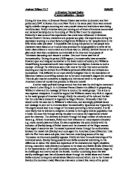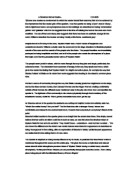How conflict affects the play
‘A Streetcar Named Desire’ has a variety of conflicts with a number of characters. However the two characters, that certainly have issues with one another are: Stanley and Blanche. Only moments into the play and the audience can already sense the apprehension between these two characters. The reason being Stanley despises Blanche, purely because she has ruined a great chance for him to move on to bigger and bolder things, other then being an auto-parts salesman. This is when he begins to have his suspicions and starts to investigate Blanches’ past and use it against her. As we can observe, by starting the play off slowly and gradually building up the theme of the story, makes the audience desire more and is ultimately a great way to captivate the viewers.
Conflicts
I will now analyse a selection of conflicts in detail, which occur in the play. The first form of conflict I have selected is situated in the scenes 1 and 2 (Pg 2-30). When Blanche first arrives she instantly tells her sister Stella, the location where she has chosen to live in is “horrible”. This is obviously an insult to both her and her husbands’ preference of lifestyle. But what really disturbs the ‘peace’ in this scene is when she confesses the fact she ‘lost’ Belle Reve, their ancestral home. As previously stated, Stanley is very annoyed and irritated when hearing this he begins to suspect that Blanche spent the money from the sale of Belle Reve on herself.
Moving on to scenes 3 and 4 (Pg 31-55), Stella and Blanche return to the apartment, where Stanley is having a drunken poker game. Immediately Stanley is offensive and inconsiderate towards Blanche as soon as she comes through the door, “You could not play….” after she politely asks if she could. Stanley has made it obvious that he does not want Blanche to be around. This minor dispute is just the start of what is to ultimately turn into an act of physical violence and the audience can sense the tension approaching. Stella and Stanley then have another argument over the radio; Stanley desires it to be off, whilst Stella would prefer it to be switched on. This petty argument develops and results in Stanley giving a blow to her. Stanley’s friends are then forced to pin him down, like a vicious beast and calm him until he comes back to his senses. In just from a simple “You could not play” we can see how the disputes and tension has increased over the scene, using this form of dramatic device certainly enthrals the audience and are just waiting to see a performance which can top the previous scenes.
During scenes 5 and 6 (Pg 56-77) Stanley does not appear in the scenes and ironically there are no dramatic points of conflict. This can be significant as it tells, the central character around these confrontations is Stanley and without him, the characters are rather peaceful and better off.
The last and without a doubt biggest conflict in the play is the rape of Blanche, scenes 10 and 11(104-124). By the end of the play Stanley has had as much as he can take of her. The jungle voices swell as Stanley slowly advances towards Blanche, ignoring her cries that he stays away. She grabs a bottle and smashes its end on the table, threatening to smash the remaining fragment on Stanley’s face. He jumps at her, grabs her arm when she swings at him, and forces her to drop the bottle. “We’ve had this date from the beginning,” he says, and she sinks to her knees. He picks her up and carries her to the bed. The pulsing music indicates that Stanley rapes Blanche. As if this is not an astonishment in itself, what’s more is that Stella refuses to believe what she is hearing and surprisingly still wants to return to Stanley.
Conclusion
As I intended to do I selected several forms of conflicts and described their effect on the play, as well as how it made it more enthralling.
In conclusion, I feel Tennessee Williams used a great selection of conflicts in and built up the tension and atmosphere slowly but excitedly. In my opinion I enjoyed the play thoroughly and the ending was a surprising outcome, which was in no way disappointing. I liked the different forms of conflict and there were constant arguments and disputes throughout the whole play, which immersed me into it.






